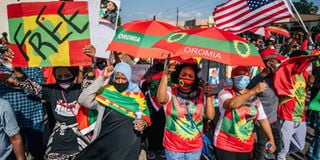Ethiopia restores full internet access after 3 weeks of shutdown

What you need to know:
- Hundesa was shot dead by armed men in the capital, triggering deadly protests.
- The unrest in the capital Addis Ababa and Oromia region has claimed the lives of over 230 people.
- The latest disruption is the most serious internet cut since Prime Minister Abiy Ahmed assumed power in 2018.
The Ethiopian government has restored access to internet over three weeks after the horn of Africa nation imposed a total shutdown across the country leaving over 16 million users offline.
The June 30, 2020 shutdown came after massive demonstrations following the killing of prominent Oromo singer Hachalu Hundesa.
Hundesa was shot dead by armed men in the capital, triggering deadly protests.
The unrest in the capital Addis Ababa and Oromia region has claimed the lives of over 230 people and displaced over 10,000 others.
The latest disruption is the most serious internet cut since Prime Minister Abiy Ahmed assumed power in 2018.
MOST SEVERE SHUTDOWN
"In terms of severity and duration, the internet shutdown has surpassed previously documented incidents in Ethiopia, including the information blackout following last year’s assassination and alleged coup attempt in the Amhara region," said Netblocks, an internet censorship monitoring group.
Last year's shutdown had a total impact of over offline 100 hours. It left the country largely offline for 10 days.
But in the latest shutdown, Netblocks clocked 23 whole days (552 hours) of nationwide impact.
It said network data have shown that much of the country's cellular networks are now back online.
The government argues that the internet cut was to arrest attempts to further fuel the violence using social media platforms.
RENEWED REPRESSION FEARS
Speaking to the Nation, an Ethiopian journalist said he fears there will be renewed repression under PM Ahmed’s administration. The prime minister is a Nobel peace prize winner.
"The internet cut comes at a time when Ethiopians most need to keep themselves informed on a number of matters including on the Covid-19 pandemic and Nile (dam) issues," said the journalist who asked not to be identified.
"I don't understand why governments in Ethiopia take internet shutdowns as their only option to contain protests," he said.
William Davison, a senior analyst at International Crises Group (ICG) in Ethiopia, said such measures could heighten public discontent.
RELIABLE INFORMATION
"Government policy is to restrict internet access during crises in order to try and save lives. While this prevents the dissemination of provocative material and makes it harder to organise protests, it also reduces the flow of reliable information, so feeding rumours and conspiracy theories,” Mr Davison told the Nation.
"Moreover, it harms the economy and increases general public discontent. The government needs to carefully balance these trade-offs, otherwise the policy may end up being self-defeating," he added.
Besides the internet shutdown, the government also shut down some TV channels, arrested prominent opposition politicians and journalists including Kenyan national Yassin Juma.
Despite PM Ahmed’s dramatic political reforms that led to the opening of political space, internet shutdown remains a trend in Africa's second most populous nation with over 105 million people.
"The authorities need to demonstrate the fruits of reform by conducting fair and transparent trials of all those arrested in relation to the recent unrest. Failure to do so will lead to accusations of politicised prosecutions and contribute to a likely continuation of political turmoil," Mr Davison said.





